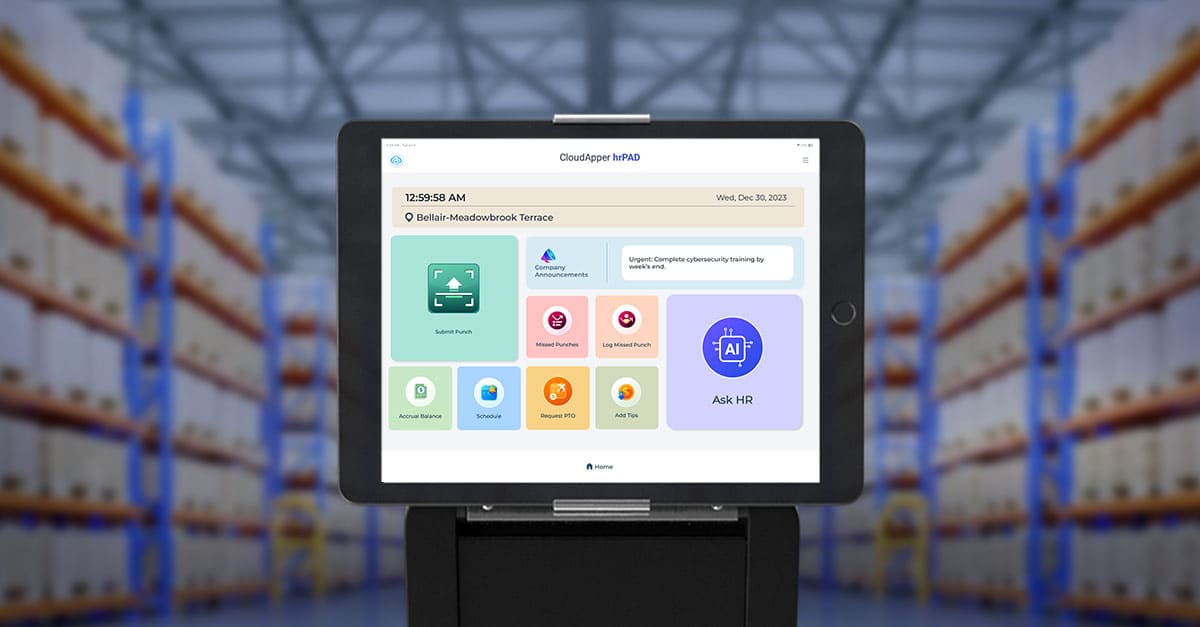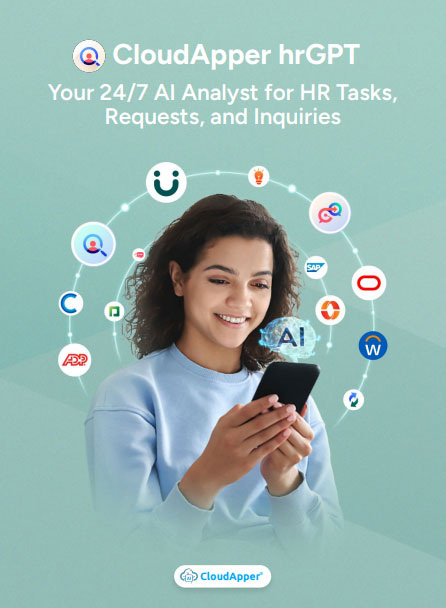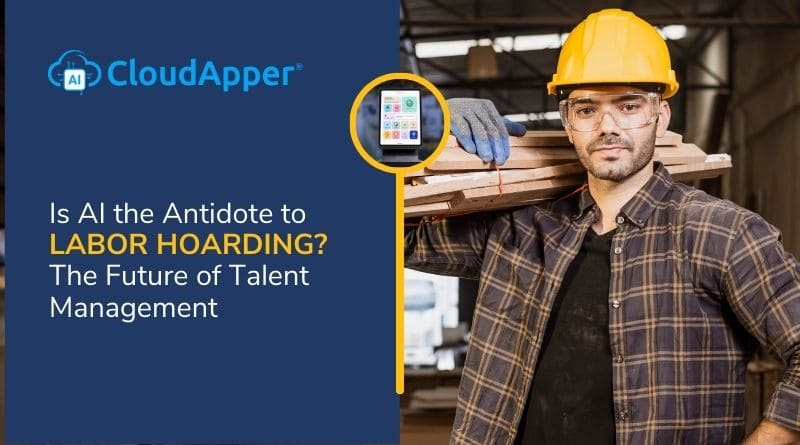Addressing the challenge of labor hoarding, CloudApper's hrPad, an AI-powered solution, offers ethical practices and personalized approaches. Features like proactive feedback, data-driven insights, and an AI assistant combat labor hoarding tendencies, fostering mutual growth for employers and employees.
Table of Contents
In talent management, the concept of “labor hoarding” has emerged as a major challenge. Labor hoarding is the practice of retaining excess staff even during economic downturns, which frequently results in workforce stagnation and disengagement. With the advancement of AI, concerns about automation exacerbating labor hoarding have surfaced, prompting the question: Can AI be the antidote to labor hoarding, or is it simply a new tool for it? This article walks us through the complex relationship between AI, labor hoarding, and the transformative power of CloudApper’s employee self-service kiosk in shaping the future of talent management.
The Problem: Labor Hoarding in the Age of AI
Companies accused of labor hoarding demonstrate the prevalence of this problem. Organizations frequently use excessive retention strategies, which unintentionally contribute to employee stagnation and disengagement. Traditional approaches to talent retention, while well-intended, can impede workforce agility and overall organizational performance.
Furthermore, the incorporation of AI into talent management has sparked concerns about biased algorithms and unequal monitoring practices. Unchecked use of AI can exacerbate labor hoarding tendencies, emphasizing the importance of ethical AI solutions in the workplace.
The Promise: AI-Powered Talent Optimization with hrPad
Introducing hrPad, an employee self-service kiosk, provides a fresh perspective. Unlike traditional approaches, hrPad focuses on ethical practices and employee well-being. Using AI, hrPad understands individual employee needs and aspirations, resulting in a more personalized approach to talent optimization.
Proactive Feedback and Mentorship Programs:
hrPad includes a feedback system to encourage ongoing communication between employees and managers. The platform seamlessly integrates automated feedback prompts, regular check-ins, and mentorship programs. This feature addresses concerns and promotes growth by giving employees timely and constructive feedback. Mentorship programs connect employees with more experienced colleagues, fostering a supportive environment that encourages skill development. This proactive approach reduces the likelihood of employees feeling stuck or undervalued, lowering the risk of labor hoarding.
Data-Driven Insights for Fair Work Environments:
hrPad uses AI to analyze a large number of data points related to employee performance, workload, and overall well-being. It employs this data to generate actionable insights for HR teams. By providing HR teams with data-driven recommendations, hrPad promotes transparency and fairness in talent management. The insights assist in identifying potential issues such as workload distribution, skill gaps, and employee dissatisfaction. This proactive approach enables HR to address concerns before they escalate, creating a work environment in which decisions are based on objective data rather than subjective biases.
Time Capture for Fair Pay:
hrPad’s time capture system accurately records and tracks employee work hours, ensuring fair pay. It uses a variety of methods for precise time tracking, including face ID, QR codes, barcodes, and NFC. Ensuring fair compensation is critical in combating labor hoarding. The time capture feature in hrPad not only eliminates manual data entry errors but also keeps a transparent and accurate record of employees’ working hours. This feature helps to create a fair and equitable pay structure, lowering the risk of employee resentment.

Employee Self-Service Capabilities:
hrPad offers self-service capabilities for employees to access schedules, request time off, and view timecards. This allows employees to manage their time-related tasks independently. Employee self-service capabilities reduce HR teams’ administrative burden, allowing them to focus on strategic initiatives. It also gives employees a sense of control over their work-related responsibilities, resulting in a more engaged and satisfied workforce.
AI Assistant for HR-Related Queries:
hrPad offers a 24/7 AI assistant that can answer HR-related questions and automate routine tasks. It provides precise and timely information by utilizing machine learning and natural language processing. The AI assistant improves HR efficiency by answering common questions, freeing up HR teams to focus on more complex issues. It ensures consistent and timely responses to employees, resulting in a positive employee experience and lowering the likelihood of dissatisfaction, which can lead to labor hoarding concerns.
AI for Mutual Growth: A Win-Win Scenario
AI-powered talent management, as exemplified by hrPad, benefits both employers and employees. Employers benefit from lower turnover rates, higher productivity, and a more skilled and adaptable workforce. Employees, on the other hand, benefit from personalized career development opportunities, increased job satisfaction, and a sense of belonging and engagement within the organization.
Transparency and trust are critical components of AI-powered talent management. Organizations can foster an open environment so that AI is perceived as a tool for mutual growth rather than a means of control.
The Future of Work: Responsible AI and Sustainable Talent Management
Ethical considerations for AI in talent management require attention. As more organizations adopt AI, hrPad stands out as a solution that prioritizes responsible development and implementation. Ongoing human oversight and control over AI algorithms ensures that ethical standards are upheld, reducing the risks of biased decision-making.
The question of whether AI can be an antidote to labor hoarding depends on responsible development and implementation. CloudApper’s hrPad shines as an example of ethical AI in talent management, with features that combat labor hoarding and promote mutual growth. Building a future-ready workforce necessitates a dedication to continuous learning and upskilling. hrPad aligns with this vision by providing a platform that not only adapts to changing workplace dynamics but also actively contributes to employees’ professional development. Contact us to unleash the power of AI in talent management truly; the future is in solutions that prioritize the well-being of both employers and employees.
What is CloudApper AI Platform?
CloudApper AI is an advanced platform that enables organizations to integrate AI into their existing enterprise systems effortlessly, without the need for technical expertise, costly development, or upgrading the underlying infrastructure. By transforming legacy systems into AI-capable solutions, CloudApper allows companies to harness the power of Generative AI quickly and efficiently. This approach has been successfully implemented with leading systems like UKG, Workday, Oracle, Paradox, Amazon AWS Bedrock and can be applied across various industries, helping businesses enhance productivity, automate processes, and gain deeper insights without the usual complexities. With CloudApper AI, you can start experiencing the transformative benefits of AI today. Learn More

CloudApper AI Solutions for HR



- Works with








- and more.
Similar Posts

Best Practices for AI in Workforce Management: What Every HR…

Why HR Process Automation is the Future of Workforce Management








